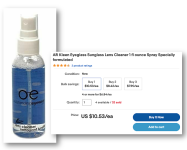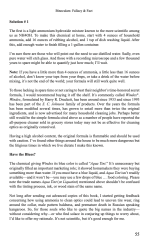WJC
Well-known member
230814
With my last thread having been generally accepted and appreciated, I feel confident to offer the following.
Science teachers have been known to say that if you drop a frog into a pan of boiling water he will instantly jump out, but if you put him in the pan and slowly increase the heat, he will sit there until boiled to death. In many ways, humans are also subject to the same situation.
I am sure that for them to still exist, their product must be still selling. This particular lens cleaner is called AR Kleen. A 1 Oz. bottle of this miraculous chemical can be purchased for a mere $10.53 each (see attachment #1).
Now, I will turn up the heat a little. That price means the product costs:
$1,347.84 a gallon!!!
But, thinking on the small scale, some people wouldn’t furrow their brow ... THEY SHOULD.
In my first binocular book, I offer 6 pages on cleaning optics. Yet, those long on opinions and short on rational thinking each rush to their own fabulous lens cleaner and tout what a great job it does. I would say that for $1,347.84 a gallon, it should!
I use the product recommended by Boeing, NASA, the US Navy, Lawrence Livermore, Labs, Tele Vue Optics, and MANY others. It costs less than $1.50 a gallon. So, those needing to have an ego stroke should probably not consider it. REALITY BITES, doesn’t it?!
Yes, I know there be others who will dispute my findings, choosing instead to listen to some merchant who’s big on sales but lacking on realistic/practical experience. Not unlike those who have read enough garbage from “experts” to say you should never use acetone of optics, with all their irrational reasons. And as far as Acetone causing cancer ... IT’S BLOODY WELL CREATED IN OUR BODIES.
Attachment #2 is one page out of my 6-page treatise on cleaning lenses.
Cheers,
Bill
With my last thread having been generally accepted and appreciated, I feel confident to offer the following.
Science teachers have been known to say that if you drop a frog into a pan of boiling water he will instantly jump out, but if you put him in the pan and slowly increase the heat, he will sit there until boiled to death. In many ways, humans are also subject to the same situation.
I am sure that for them to still exist, their product must be still selling. This particular lens cleaner is called AR Kleen. A 1 Oz. bottle of this miraculous chemical can be purchased for a mere $10.53 each (see attachment #1).
Now, I will turn up the heat a little. That price means the product costs:
$1,347.84 a gallon!!!
But, thinking on the small scale, some people wouldn’t furrow their brow ... THEY SHOULD.
In my first binocular book, I offer 6 pages on cleaning optics. Yet, those long on opinions and short on rational thinking each rush to their own fabulous lens cleaner and tout what a great job it does. I would say that for $1,347.84 a gallon, it should!
I use the product recommended by Boeing, NASA, the US Navy, Lawrence Livermore, Labs, Tele Vue Optics, and MANY others. It costs less than $1.50 a gallon. So, those needing to have an ego stroke should probably not consider it. REALITY BITES, doesn’t it?!
Yes, I know there be others who will dispute my findings, choosing instead to listen to some merchant who’s big on sales but lacking on realistic/practical experience. Not unlike those who have read enough garbage from “experts” to say you should never use acetone of optics, with all their irrational reasons. And as far as Acetone causing cancer ... IT’S BLOODY WELL CREATED IN OUR BODIES.
Attachment #2 is one page out of my 6-page treatise on cleaning lenses.
Cheers,
Bill
Attachments
Last edited:








